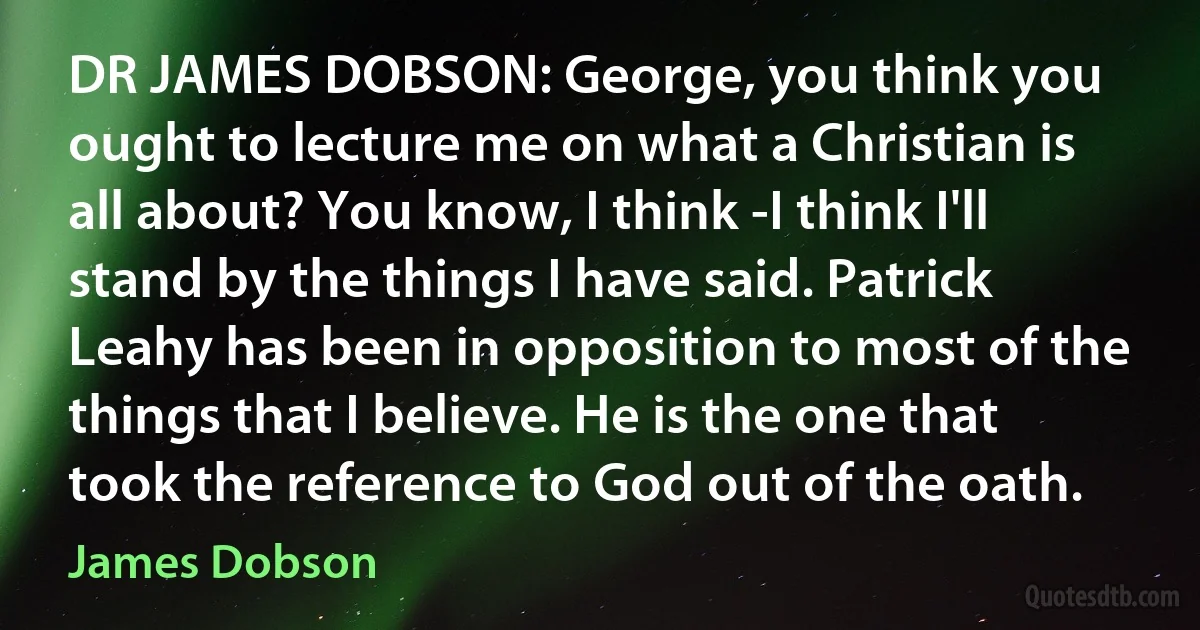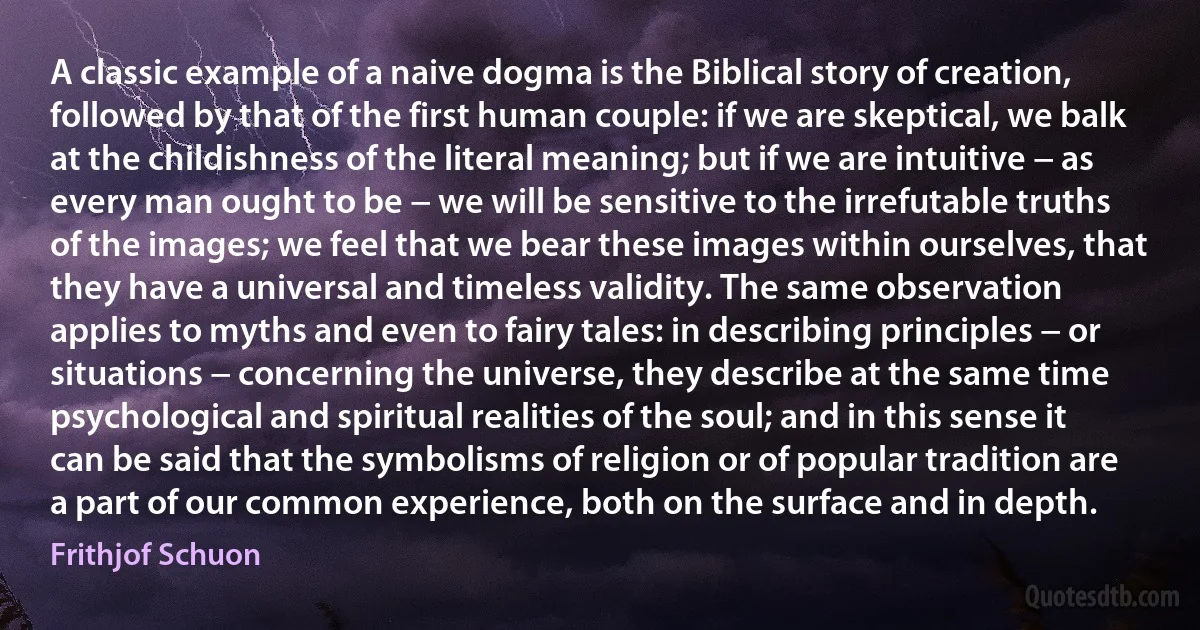Ought Quotes - page 97
Human settlements are like living organisms. They must grow, and they will change. But we can decide on the nature of that growth - on the quality and the character of it - and where it ought to go. We don't have to scatter the building blocks of our civic life all over the countryside, destroying our towns and ruining farmland.

James Howard Kunstler
Those forces that are preparing the appearance of Antichrist will have a leading significance in public life. Antichrist will be a man and not the devil incarnate. ... That man wants to be in place of Christ, to occupy His place and possess that which Christ ought to possess. He wants to possess the same attraction and authority over the whole world.
And he will receive that authority before his own destruction and that of the whole world. He will have a helper, a Magus, who, by the power of false miracles, will fulfill his will and kill those that do not recognize the authority of Antichrist.

John of Shanghai and San Francisco
Given that we desire long life, should we not take eternal life into account? If we long for a kingdom which, however enduring, has an end, and glory and joy which, great as they are, will fade, and wealth that will perish with this present life, and we labour for the sake of such things; ought we not to seek the kingdom, glory, joy and riches which, as well as being all-surpassing, are unfading and endless, and ought we not to endure a little constraint in order to inherit it?

Gregory Palamas
Christian religion is not a certain philosophic system, about which learned men, trained in metaphysical studies, argue and then either espouse or reject, according to the opinion each one has formed. It is faith, established in the souls of men, which ought to be spread to the many and be maintained in their consciousnesses.

Nectarios of Aegina
Mr. President, before I conclude, I feel obliged to comment briefly on two amendments that I intend to offer, designed to assist U.S. citizens who have had their property confiscated--that is to say illegally stolen--by foreign governments receiving foreign aid from the taxpayers of the United States. The Senate passed one of these amendments 96 to 4. I stood down there during the vote and Senators came in and said, "good amendment" and all of the rest of it. The State Department, however, and other U.S. officials turned a deaf ear to U.S. citizens whose property had been unlawfully taken from them. Unfortunately, the Senate must again send a wakeup call to the U.S. State Department. That message must go to the countries abusing the rights of U.S. citizens, and those countries ought to be denied even one dime of foreign aid money until they cut this out.

Jesse Helms
Let not sleep fall upon thy eyes till thou has thrice reviewed the transactions of the past day. Where have I turned aside from rectitude? What have I been doing? What have I left undone, which I ought to have done? Begin thus from the first act, and proceed; and, in conclusion, at the ill which thou hast done, be troubled, and rejoice for the good.

Pythagoras
Now, everybody was a "pro-Boer" who did not agree to everything Mr. Chamberlain did, and who said "Here is a people fighting gallantly for the independence of their own country; for goodness sake do not attribute every sort of evil to them while you are fighting them; when you have got them down, treat them with the respect and honour that such a people ought to receive-a people who, though they may be mistaken and entirely wrong, are conscientiously fighting for the independence of their own land." For taking this view he was called a pro-Boer. That again was a gross slander and falsehood, and that newspapers and politicians should stoop to a mean artifice of that kind was a scandal and a disgrace to the political life of to-day.

Henry Campbell-Bannerman
The Cubans who fought for our independence and at that very moment were giving their blood and their lives believed in good faith in the joint resolution of the Congress of the United States of April 20, 1898, which declared that "Cuba is, and by right ought to be, free and independent.”... But that illusion was followed by a rude awakening. After two years of military occupation of our country, the unexpected happened... a new law was passed by the United States Congress... stated that the constitution of the Cuba must have an appendix under which the United States would be granted the right to intervene in Cuba's political affairs and, furthermore, to lease certain parts of Cuba for naval bases or coal supply station.

Fidel Castro
We ought to consider what is the end of government, before we determine which is the best form. Upon this point all speculative politicians will agree, that the happiness of society is the end of government, as all Divines and moral Philosophers will agree that the happiness of the individual is the end of man. From this principle it will follow, that the form of government which communicates ease, comfort, security, or, in one word, happiness, to the greatest number of persons, and in the greatest degree, is the best.

John Adams
The turpitude, the inhumanity, the cruelty, and the infamy of the African commerce in slaves, have been so impressively represented to the public by the highest powers of eloquence, that nothing that I can say would increase the just odium in which it is and ought to be held. Every measure of prudence, therefore, ought to be assumed for the eventual total extirpation of slavery from the United States.

John Adams
The question will be asked and ought to be looked at, what is to be the resource if loans cannot be obtained? There is but one, "Carthago delenda est." Bank paper must be suppressed, and the circulating medium must be restored to the nation to whom it belongs. It is the only fund on which they can rely for loans; it is the only resource which can never fail them, and it is an abundant one for every necessary purpose. Treasury bills, bottomed on taxes, bearing or not bearing interest, as may be found necessary, thrown into circulation will take the place of so much gold and silver, which last, when crowded, will find an efflux into other countries, and thus keep the quantum of medium at its salutary level. Let banks continue if they please, but let them discount for cash alone or for treasury notes.

Thomas Jefferson
Love alone is credible; nothing else can be believed, and nothing else ought to be believed. This is the achievement, the "work” of faith: to recognize this absolute prius, which nothing else can surpass; to believe that there is such a thing as love, absolute love, and that there is nothing higher or greater than it; to believe against all the evidence of experience ("credere contra fidem” like "sperare contra spem”), against every "rational” concept of God, which thinks of him in terms of impassibility or, at best, totally pure goodness, but not in terms of this inconceivable and senseless act of love.

Hans Urs von Balthasar
If man must preach, let him preach something that is edifying, and from texts that are known to be true. [...] Every part of science, whether connected with the geometry of the universe, with the systems of animal and vegetable life, or with the properties of inanimate matter, is a text as well for devotion as for philosophy; for gratitude, as for human improvement. It will perhaps be said, that if such a revolution in the system of religion takes place, every preacher ought to be a philosopher. Most certainly; and every house of devotion a school of science.

Thomas Paine
When a book, as is the case with the Old and New Testament, is ushered into the world under the title of being the Word of God, it ought to be examined with the utmost strictness, in order to know if it has a well-founded claim to that title or not, and whether we are, or are not, imposed upon; for as no poison is so dangerous as that which poisons the physic, so no falsehood is so fatal as that which is made an article of faith.

Thomas Paine
A good Prince ought to make his passions subservient to the interest of his country, for all things are either good or bad for him as they regard his people; but Francis had been bred up with different sentiments from these, flattery the bane of all princes had poisoned his mind; he instead of regarding the affairs of his country, totally gave himself to pleasure, which was the reason all his military operations met with such frequent delays.

George III of the United Kingdom
It is in vain to say human beings ought to be satisfied with tranquility: they must have action; and they will make it if they cannot find it. Millions are condemned to a stiller doom than mine, and millions are in silent revolt against their lot. Nobody knows how many rebellions besides political rebellions ferment in the masses of life which people earth. Women are supposed to be very calm generally: but women feel just as men feel; they need exercise for their faculties, and a field for their efforts as much as their brothers do; they suffer from too rigid a restraint, too absolute a stagnation, precisely as men would suffer; and it is narrow-minded in their more privileged fellow-creatures to say that they ought to confine themselves to making puddings and knitting stockings, to playing on the piano and embroidering bags. It is thoughtless to condemn them, or laugh at them, if they seek to do more or learn more than custom has pronounced necessary for their sex.

Charlotte Brontë



